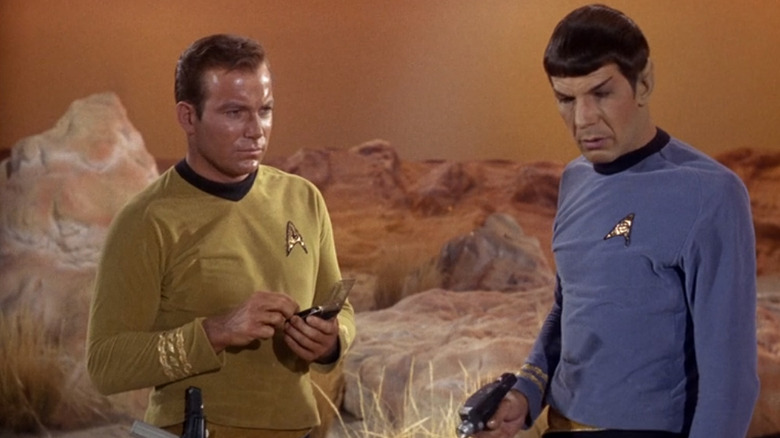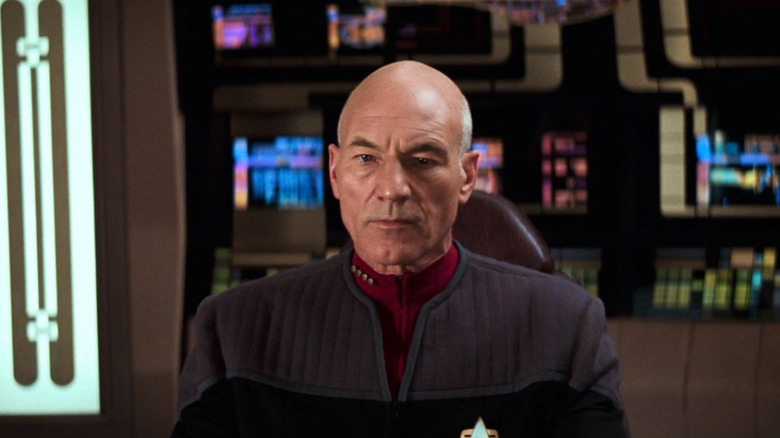Where To Watch The Entire Star Trek Franchise
It's been nearly 60 years since a little science fiction show called "Star Trek" premiered on NBC. Since then, Gene Roddenberry's experiment has grown and flourished into one of the most successful media franchises in history, spanning no fewer than 12 television series and 13 motion pictures, not to mention helping to establish modern genre fandom as we currently understand it.
At the time of writing, there are also more "Star Trek" shows currently in production than there have ever been at any time in history. Whether we want to revisit the same characters and period of time as the original series with "Strange New Worlds," say farewell to Admiral Jean-Luc Picard (Patrick Stewart), or gaze even further into a wrecked future with "Star Trek: Discovery" (whose upcoming fifth season will be its last), there are countless opportunities to go where no one has gone before. And this isn't even counting the two animated series, "Prodigy" and "Lower Decks."
Each new "Star Trek" fan, however, has a rather significant challenge in front of them — that is, to familiarize themselves with the events and lore that have already taken place in previous shows and films, to better understand what happens now. Luckily, we've already compiled a handy guide for the order to view all the "Star Trek" franchises in. But where exactly does one find each and every title on this admittedly long list?
All the TV series are available on Paramount Plus
When it comes to all of the various television iterations of "Star Trek," it is fairly straightforward. Viewers can find all of them on Paramount+, from the original series (including the first pilot, "The Cage," featuring Jeffrey Hunter as Christopher Pike captaining the Enterprise instead of William Shatner's Kirk) up through the current "Star Trek: Discovery," "Strange New Worlds," and "Picard." This also includes the series that originally aired from the late 1980s up through the early aughts: "The Next Generation," "Deep Space Nine," "Voyager," and "Enterprise."
The streamer is also host to all of the animated entries in the "Star Trek" pantheon, including the first animated version that aired in the 1970s, and "Star Trek: Lower Decks." Paramount+ also carries "Star Trek: Prodigy," though episodes air on Nickelodeon first before they arrive on the streamer. "Short Treks," the series of short standalone stories that provide more in-depth exploration into the worlds of "Discovery," "Picard," and "Strange New Worlds," is also available there.
Like we said, it's straightforward — at least for all the entries into the franchise that are or were televised at one point. When it comes to the motion pictures, however, it gets a bit more complicated.
Star Trek movies are found on different streamers
Let's start with the movies related to the original series, which follow the likes of Captain Kirk, Mr. Spock (Leonard Nimoy), Lieutenant Uhura (Nichelle Nichols) and the rest of the original crew of the USS Enterprise. In all, six movies were made that focused on this crew, starting with "Star Trek: The Motion Picture" in 1979 and ending with "Star Trek VI: The Undiscovered Country" in 1991. Though none are available to watch on Paramount+ along with their televised cousins, they are available on HBO Max.
Next are the four movies that revolved primarily around the characters of "The Next Generation," from Captain Picard and Commander William Riker (Jonathan Frakes) to Lieutenants LaForge (LeVar Burton) and Data (Brent Spiner). These are also all available to stream on HBO Max, starting with 1994's "Star Trek Generations" — which served as a kind of passing of the movie mantle from the cast of the original series to that of "TNG" — through 2002's "Star Trek: Nemesis."
Finally, there's the Kelvin timeline, J.J. Abrams' split timeline with fresh takes on Kirk (Chris Pine), Spock (Zachary Quinto), Uhura (Zoe Saldana), and all the rest. All three of those films — "Star Trek," "Star Trek Into Darkness," and "Star Trek Beyond" — are available back on Paramount+.


